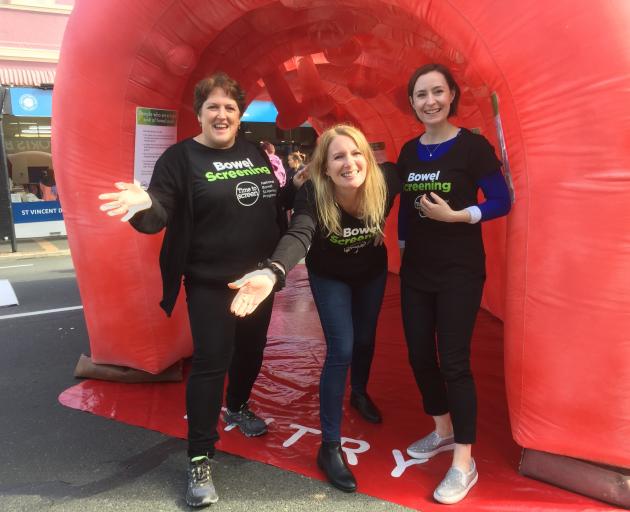
A year into the Southern DHB roll-out of the National Bowel Screening programme and "tangible effects'' can already be seen.
That's the message from Bowel Screening Programme clinical lead Dr Jason Hill, as preliminary figures show that 62 people were diagnosed with bowel cancer and 552 people with non-cancerous polyps were identified and treated in the first year.
"We're absolutely delighted with these results, which demonstrate the tangible effects of this programme.
"As well as identifying instances of bowel cancer, it's significant that we are identifying and removing many cases of polyps, which over time can turn into bowel cancer,'' he said.
Since the programme began in April 2018, about 26,000 home testing kits have been sent out, dozens of community engagement sessions have been held, nine inspirational "champions'' have stepped up, and a giant inflatable bowel has been seen at multiple community events.
"All that effort to raise awareness has really paid off - we have the highest participation rates for the country,'' Dr Hill said.
Preliminary Ministry of Health figures showed that 70.6% of eligible residents in the Southern DHB were taking part in bowel screening.
Maori participation was also high, at 70.2%.

"It has been exhausting getting there, but I have the absolute pleasure of speaking to patients every day who have been through a process which is patient-focused and responsive.
"The feedback has been very positive from patients and their families.''
The new, expanded gastroenterology unit at Dunedin Hospital had allowed more flexibility for a range of services, but staffing levels were a limiting factor, Dr Hill said.
The Southern DHB has five gastroenterology endoscopists, two nurse endoscopists in training, one gastroenterology trainee and five surgical endoscopists across the public system for the district.
To continue to meet demand successfully, Dr Hill needs two more full-time endoscopists for the Southland and Otago district.
However, with DHBs across New Zealand rolling out bowel screening, it is a competitive market for endoscopists.
"So, I need to make Dunedin and Southern as attractive as possible, in terms of lifestyle and experiences, to attract and retain people.
"It is important that they go home and tell people that they have had a great time, which encourages others to come.''
Dr Hill and his team are keen to increase bowel screening participation rates still further, and are focusing on raising awareness among the Asian and Pasifika populations, who now have participation rates of 55.2% and 55.4% respectively.
Another avenue being explored in the campaign to encourage people to participate in the bowel screening programme was enlisting the support of young people.
With this in mind, plans are under way to give presentations at high schools, Dr Hill said.
"We have found a real difference among the city's various communities in terms of their approach to bowel screening - for some their spiritual and religious beliefs are paramount.
"We have been very fortunate to have the support of our bowel screening champions within those communities - they have been great advocates for the programme.''
"Every person involved in the programme has given 110%, and I'm very proud of what we have achieved so far,'' Dr Hill said.
• The free bowel screening programme is offered every two years to men and women aged 60 to 74 years, who are eligible for publicly funded health care.
BRENDA.HARWOOD @thestar.co.nz














